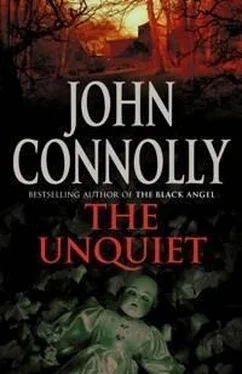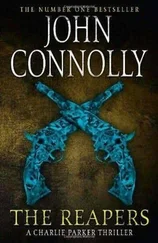The detective quoted in one of the newspaper articles was Bobby O’Rourke. He was still a detective, as far as I knew, although he worked out of Internal Affairs. I got him at his desk just before he left for the day, and he agreed to meet me for a beer over in Geary’s within the hour. I parked on Commercial and found him seated in a corner, flipping through some photocopies and eating a hamburger. We had met a couple of times in the past, and I’d helped him to fill in the blanks in a case involving a Portland P.D. cop named Barron who had died under what could euphemistically be termed “mysterious circumstances” a few years before. I didn’t envy O’Rourke his job. The fact that he was with IA meant that he was good at his work. Unfortunately, it was work at which some of his fellow cops didn’t want him to be good.
He wiped his hands on a napkin, and we shook.
“You eating?” he asked.
“Nope. Going to dinner in an hour or two.”
“Anyplace flash?”
“Joel Harmon’s house.”
“I’m impressed. We’re going to be reading about you in the society columns.”
We spoke a little about the annual IA report that was about to be published. It was the usual stuff, mainly use-of-force allegations and complaints about the operation of police vehicles. The patterns remained pretty consistent. The complainants were typically young males, and the use-of-force incidents mostly related to breaking up fights. The cops had used only their hands to subdue the combatants, and the guys involved were mostly white and under thirty, so it wasn’t like senior citizens or the Harlem Globetrotters were being rousted. Nobody had been suspended for longer than two days as a result of complaints. All told, it wasn’t a bad year for IA. Meanwhile, the Portland P.D. had a new chief. The old chief had stepped down earlier in the year, and the city council had been considering two candidates, one who was white and local, and one who was black and from the South. Had the council gone for the black candidate, it would have increased by 100 percent the number of black cops in Portland, but instead it had opted for local experience. It wasn’t a bad decision, but some minority leaders were still sore. The old chief, meanwhile, was rumored to be considering a run for governor.
O’Rourke finished his burger and took a sip of his IPA. He was a slim, fit guy who didn’t look like burgers and beer usually accounted for too many of his calories.
“So, Daniel Clay,” he said.
“You remember him?”
“I remember the case, and what I didn’t recall I checked before I came over here. I only met Clay twice before he went missing, so there’s a limit to what I can tell you.”
“What did you think of him?”
“He seemed genuinely upset by what had happened. He looked to be in shock. He kept referring to them as his ‘kids.’ We started investigating, along with the state police, the sheriffs, the local cops, social services. The rest you probably know already: some points of correspondence came up in other cases over a period of time, and a number of those cases could be traced back to Clay.”
“You think it was a coincidence that Clay had worked with the kids?”
“There’s nothing to indicate that it wasn’t. Some of the children were particularly vulnerable. They’d been abused before, and most of them were in the very early stages of therapy and intervention. They hadn’t even got around to talking about the first series of abuses before the next began to happen.”
“Ever come close to an arrest?”
“No. A girl, thirteen years old, was found wandering in fields outside of Skowhegan at three in the morning. Barefoot, clothes torn, bleeding, no underwear. She was hysterical, babbling about men and birds. She was disoriented and didn’t seem to know where she’d been held or what direction she’d walked from, but she was clear on the details: three men, all masked, taking turns with her in what seemed to be an unfurnished room in a house. We got some DNA samples from her, but most of them were pretty messed up. Only a couple were clean, and they didn’t match anything on the databases. About a year ago we tried again as part of a cold case review, but still zip. It’s bad. We should have done better on it, but I don’t see how.”
“What about the kids?”
“I haven’t kept track of all of them. Some have come back on the radar. They were screwed-up kids, and they became screwed-up adults. I always felt sorry for them when I saw their names come up. What the hell kind of chance did they have after what was done to them?”
“And Clay?”
“He literally vanished. His daughter called us, said she was worried about him, that he hadn’t been home in two days. They found his car outside Jackman, up by the Canadian border. We thought he might have fled the jurisdiction, but there was no reason for him to do that, apart from shame, maybe. He’s never been seen again.”
I leaned back in my chair. I wasn’t much wiser than before I’d sat down. O’Rourke recognized my dissatisfaction.
“Sorry,” he said. “Bet you were hoping for a revelation.”
“Yeah, a blinding flash of light.”
“So how did this come up?”
“Clay’s daughter hired me. Someone has been asking questions about her father. It has her rattled. You ever hear of a man named Frank Merrick?”
Bingo. O’Rourke’s face lit up like the Fourth of July.
“Frank Merrick,” he said. “Oh yeah. I know all about Frank. Fatal Frank, they used to call him. He’s the guy, the one who’s shaking up Clay’s daughter?”
I nodded.
“Makes sense, in a way,” said O’Rourke.
I asked him why.
“Because Merrick ’s daughter was also a patient of Daniel Clay’s, except she went the same way he did. Lucy Merrick, that was her name.”
“She disappeared?”
“Reported missing two days after Clay, but it looks like she was gone for longer than that. Her foster parents were animals. Told the social workers she was always running away, and they’d just gotten tired of chasing her ass down. From what they could recall, they’d last seen her four or five days earlier. She was fourteen. I don’t doubt she was a handful but, you know, she was still a kid. There was talk of pressing charges against the foster parents, but nothing ever happened.”
“And where was Merrick when all this was going on?”
“In jail. Let me tell you: Frank Merrick is an interesting guy.” He loosened his tie. “Order me another beer,” he said. “Better get something for yourself too. It’s that kind of story.”
Frank Merrick was a killer.
That word had become so devalued through overuse that every mean little kid with a knife who overstepped the line and gutted a drinking buddy in a bar fight over some girl in a too-tight dress, every jobless no-hoper who ever held up a liquor store, then shot the guy earning seven bucks an hour behind the counter, whether through panic or boredom or just because he had a gun in his hand and it seemed a shame not to see what it could do, every one of them received the title of “killer.” It was used in the newspapers to drive up sales, in the courtrooms to drive up sentences, on cell blocks to make reputations and buy some breathing space from assaults and challenges. But it didn’t mean anything, not really. Killing someone didn’t make you a killer, not in the world through which Frank Merrick walked. It wasn’t something you did once, either by accident or design. It wasn’t even a lifestyle choice, like vegetarianism or nihilism. It was something that lay in your cells, waiting for a moment of awakening, of revelation. In that way, it was possible to be a killer even before you took your first life. It was part of your nature, and it would show itself in time. All that it took was a catalyst.
Читать дальше












